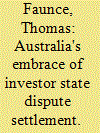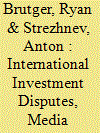| Srl | Item |
| 1 |
ID:
140725


|
|
|
|
|
| Summary/Abstract |
This paper explores the origins of investor-state dispute settlement (ISDS) treaties and their implications for the Australian social contract. This analysis includes how and why ISDS emerged in NAFTA, was rebuffed with the failure of the Multilateral Agreement on Investment (MAI), and became incorporated into most subsequent bilateral US trade and investment agreements. The paper considers Australia's exposure to ISDS—first through using it in bilateral investment agreements in nations with inadequate governance mechanisms to support the rule of law, then turning against it when a multinational tobacco company tried to use the mechanism to overturn scientifically endorsed, democratically approved and constitutionally validated tobacco plain packaging measures. The paper concludes by exploring the hypothesis that an alternative governance vision can be achieved in which the system of investment arbitration and trade law is made coherent with presumptively more democratically legitimate normative systems such as constitutional and international law.
|
|
|
|
|
|
|
|
|
|
|
|
|
|
|
|
| 2 |
ID:
186334


|
|
|
|
|
| Summary/Abstract |
This paper puts forth a theory explaining domestic backlash against international investment law by connecting media coverage—specifically the bias in the news media’s selection of international disputes—to public opinion formation towards international agreements. To test our theory, we examine both the content and effects of the media’s reporting on international disputes, focusing on the increasingly controversial form known as investor-state dispute settlement (ISDS). We find that newspaper outlets in both the United States and Canada have a bias in favor of covering disputes filed against their home country as opposed to those filed by home country firms. Using two national survey experiments fielded in the United States and Canada, we further find that the bias in news story selection has a strong negative effect on attitudes towards ISDS and related agreements, especially among highly nationalistic individuals.
|
|
|
|
|
|
|
|
|
|
|
|
|
|
|
|
| 3 |
ID:
086427


|
|
|
|
|
| Publication |
2009.
|
| Summary/Abstract |
Over the past decade, a number of countries in the Asia Pacific region have concluded a new generation of FTAs that liberalise trade in goods and services while also containing investment protection provisions. This paper provides an overview of the recent trends giving special attention to the impact of Investor State Dispute Settlement (ISDS) cases which has influenced the evolution of investment rule-making over the last decade. The paper asserts that investment disputes have influenced the refinement of the provisions of the new generation of investment agreements as well as the inclusion of a series of procedural and substantive innovations in these agreements.
*Ambassador of Costa Rica to the European Union, Belgium and Luxembourg. This paper was written on the basis of several research projects in which the author participated, before assuming the current position with the Costa Rican government, as consultant with UNCTAD. However, the opinions and views expressed in this paper do not represent the position of UNCTAD, nor the Government of Costa Rica and fully fall under responsibility of the author.
|
|
|
|
|
|
|
|
|
|
|
|
|
|
|
|